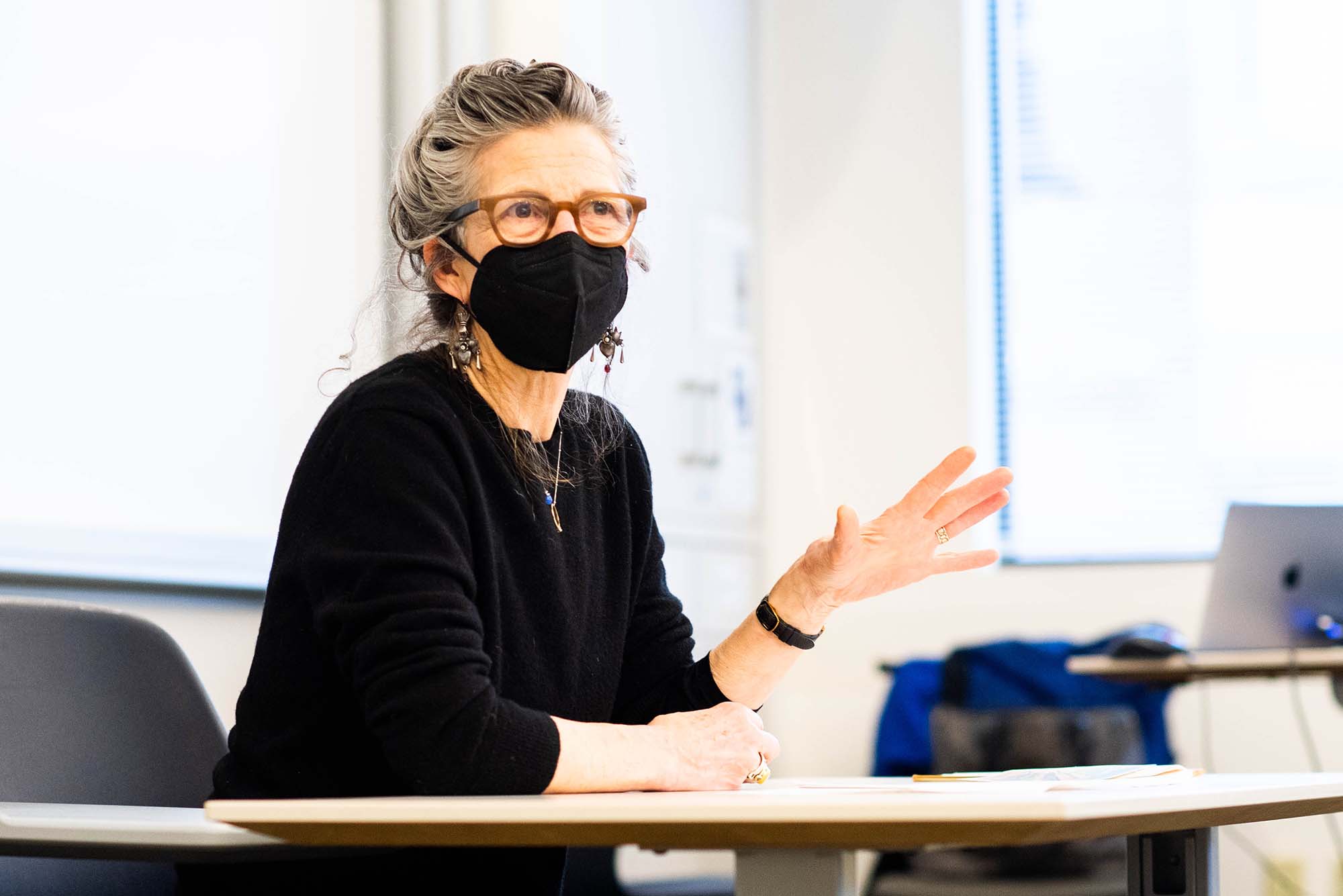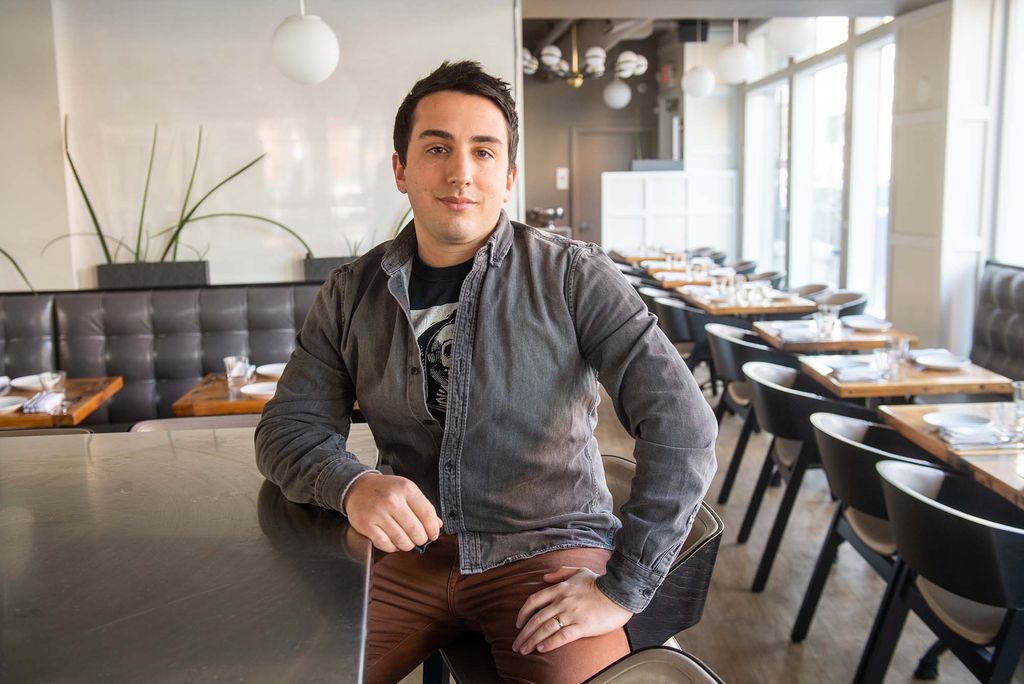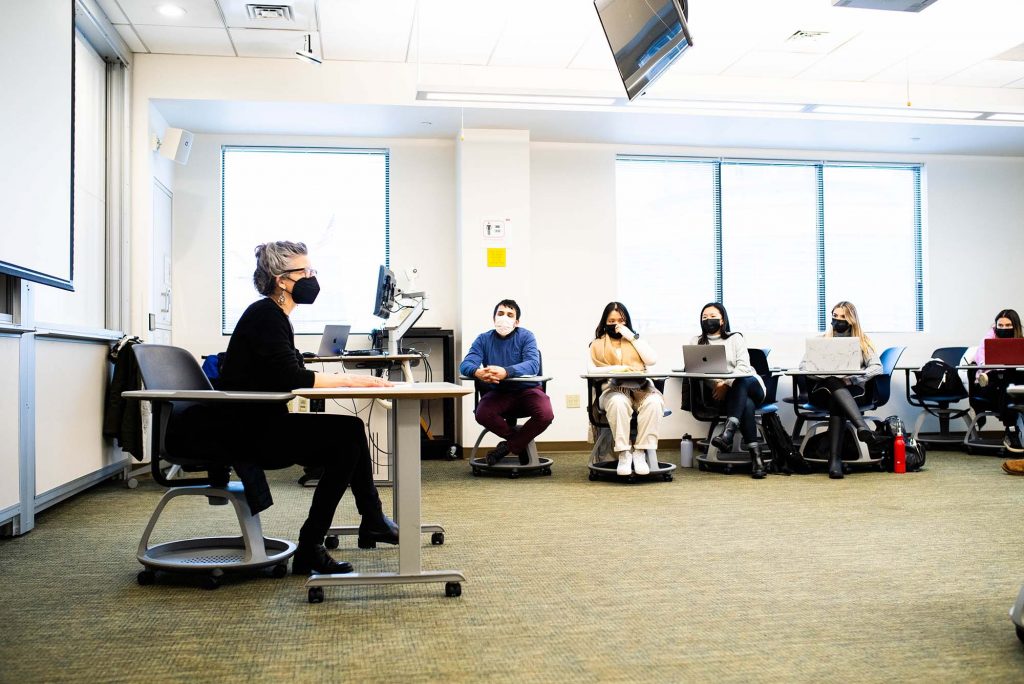Amid COVID-19’s Blow to Restaurants, BU Creates New Courses about the Industry

Prize-winning chef Jody Adams is one of Boston’s most prominent restaurateurs. She recently spoke to SHA students about the industry’s struggle with COVID-19 as well as longer-term problems. Photo by Jackie Ricciardi
Amid COVID-19’s Blow to Restaurants, BU Creates New Courses about the Industry
School of Hospitality Administration concentration addresses long-term problems that mushroomed during pandemic
COVID-19 has been a killer asteroid for the food service industry, closing—in many cases, permanently—an estimated 80,000 restaurants nationwide. Earlier this month, renowned Boston restaurateur Jody Adams confided to a School of Hospitality Administration class her anti-pandemic business plan.
Meatballs.
The James Beard Award–winning chef admitted that she had to swallow hard, metaphorically, before putting that item on her menus. “I never thought that I would be selling meatballs,” she told the students in Seth Gerber’s Future of the Restaurant Business class. “And at Trade”—the Financial District restaurant she co-owns—“the top seller is meatballs.” When another Adams establishment, Porto, in Back Bay, debuted as a high-end Mediterranean-seafood eatery, “it was a disaster. We switched: Italian, meatballs, pasta, more casual.
“It saved us during COVID.”
Adams, fellow restaurateur Gerber (SHA’12, Questrom’21)—a part-time SHA instructor—and his dozen master’s students all wore masks in the classroom, visual reminders of the body blow COVID has dealt eateries and that has made SHA’s new concentration in Restaurant Management and Experiences especially timely. Gerber’s class is one of five electives in the concentration, which debuted in the fall and also has four mandatory courses.

Training better restaurant operators, Gerber says, is necessary to address industry problems festering long before the pandemic, from tight profit margins to staggering rates of employee substance abuse. Waitstaff endure the stresses of low pay, work that keeps them hustling on their feet for long stretches, and rude customers. Coronavirus turned this nonstop trot of problems into a galloping crisis, as “restaurants literally bled to death the last two years—their bank accounts,” Adams told students.
She and Gerber stressed that rescuing the industry is about more than helping an economic engine employing 11.5 million Americans. Whether your tastes and budget run to white tablecloths and sommeliers or the pizza joint down the street, restaurants serve as neighborhood commons for patrons wanting to relax and up-and-coming strivers seeking to launch careers.
“A restaurant to me is one of the most purely democratic and open-sourced things that exist,” Gerber told his students. “But that does not excuse or change the fact that there are a lot of real issues.”
Gerber himself survived a professional near-death experience at COVID’s start as a partner in Mida, an Italian eatery with spots in Boston and Newton. “It was devastating at first,” he tells BU Today, recalling how his business had to furlough its employees for eight weeks. The owners had just agreed to lease their new Newton space when the virus hit. Mida survived on the back of its takeout business and by negotiating a deal to provide meal service to local healthcare workers.
“The pandemic certainly emphasized the need for a class like this,” he says. “There’s been a sea change on the horizon in the restaurant industry for a long time. We see this convergence of new technology; takeout was increasing as a market segment pre-COVID at a hefty pace—there were already a lot of [spending] on takeout platforms, the burgeoning creation of ghost kitchens,” or delivery-only restaurants.

“It’s impossible to teach these courses without addressing the issues of today,” such as COVID, says Leora Lanz (COM’87), SHA assistant dean of academic affairs and an associate professor of the practice. “For us to think about the future of the business, we need to understand the issues, how these last 18 months brought so much more to the surface, and figure out how we can learn from this and create viable and creative cost-effective solutions.”
“Even without the pandemic, I definitely would have jumped on this class,” says Chris Keating (SHA’23), a part-time student and full-time food and beverage manager at Boston’s Seaport Hotel. “With everybody else in this class, some people do have restaurant experience, so it’s very interesting to hear how everyone else is doing as well and how they’ve been approaching things. It’s not even just learning from the professor; it’s learning from my classmates as well.”
The federal government showered billions in pandemic relief on the restaurant industry. But its Restaurant Revitalization Fund (RRF) turned down two-thirds of applicants, which Gerber attributes to regulatory restrictions and restaurateurs’ lack of legal and financial savvy—the latter highlighting the need for SHA’s restaurant concentration.
Boston Mayor Michelle Wu joined other big cities’ leaders in signing a January letter imploring Congress to replenish the RRF. “Restaurants and bars are months beyond struggling, they are dying in plain sight,” the letter said. Adams told the class that one benefit of the last two years was collaborating with colleagues to lobby for the fund to save an industry they love.
She shared personal anecdotes to show the depth of her professional passion, recalling her crazy work schedule when her children were young: “I wasn’t home at nights and I wasn’t home weekends. I was very fortunate my husband was able to play that role, and they probably had more fun with him than they would have with me. [At times], I wanted to quit because I wanted to be with my children, and I couldn’t quit because I had to provide for my children.”
SHA’s other concentrations demonstrating education in specific areas to prospective employers are Innovation and Entrepreneurship, Real Estate and Finance, Digital Marketing, Business of Senior Living, and Revenue Management and Analytics.

Comments & Discussion
Boston University moderates comments to facilitate an informed, substantive, civil conversation. Abusive, profane, self-promotional, misleading, incoherent or off-topic comments will be rejected. Moderators are staffed during regular business hours (EST) and can only accept comments written in English. Statistics or facts must include a citation or a link to the citation.